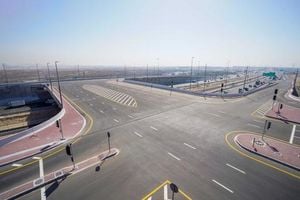On November 21, 2024, Rabbi Zvi Kogan, a 28-year-old ultra-Orthodox Israeli-Moldovan rabbi, mysteriously disappeared from his home in Abu Dhabi, United Arab Emirates (UAE). His wife reported him missing, raising alarms among the local Jewish community, particularly as Kogan served as the rabbi for the Chabad community and managed Dubai's only kosher grocery store.
Just three days later, authorities discovered his body 150 kilometers from Abu Dhabi, leading to widespread condemnation and concern. The Israeli Prime Minister's office confirmed the tragic news, labeling the shocking incident as “an abhorrent act of antisemitic terrorism.” This stark accusation underscored the gravity of the situation, particularly as it unfolded amid increasing tensions between Israel and Palestinian factions, which had escalated dramatically following Hamas's attack on Israel on October 7, 2023.
Initial media coverage of Kogan's death faced backlash, particularly from critics who deemed headlines such as “Israeli rabbi who disappeared in Dubai is found dead” as insufficiently serious. The New York Times was pressured to alter its initial headline to reflect the circumstances more accurately, leading to the later version: “An Israeli Rabbi Is Abducted and Killed in the U.A.E.” Critics slammed the media for downplaying the incident, emphasizing Kogan’s murder was targeted, driven by antisemitism.
Public figures voiced outrage on social media, with former New York Governor Andrew Cuomo stating, “Rabbi Kogan was not ‘found dead,’ he was murdered,” highlighting the media's failure to accurately categorize the event as one of antisemitic targeting. Congressman Ritchie Torres also chimed in, asserting the act should be called out as an act of terrorism against the Jewish community.
Compounding the sorrow within the community, Kogan's funeral was attended by hundreds of mourners, reflecting the deep sense of loss and fear instigated by such violence. His wife, Rivky Kogan, also faced emotional trauma, having relocated to the UAE with her rabbi husband, and being the niece of Rabbi Gavriel Holtzberg, who was murdered alongside his wife during the 2008 Mumbai attacks.
Looking toward justice, Emirati authorities swiftly acted by arresting three Uzbek nationals, who local reports suggest fled to Istanbul after allegedly committing the crime. Initial speculation linked the murder to geopolitical tensions as no clear motive has been revealed, but fears of the Iranian influence loomed over this case. Interestingly, Iran has been accused of harboring criminal gangs for targeting political dissidents, yet the country has denied any involvement.
This incident marks another troubling chapter for the UAE, which has sought to present itself as a safe haven for international tourists and residents, showcasing its tolerance and diversity following the historic Abraham Accords signed with Israel. This diplomatic move had vastly improved relations between the two countries, prompting many Israelis to flock to the UAE for commerce and tourism. But now, after this murder, there are concerns about whether such safety is genuinely guaranteed.
Dr. Monica Marks, an assistant professor of Middle East politics at New York University Abu Dhabi, articulated the dilemma facing the UAE’s leadership: how to maintain their carefully crafted image of tolerance after such violent acts threaten to undermine it. The killing directly contradicts the UAE's narrative, as Emirati officials project strength and competence to counter the embarrassment brought by this incident.
Previous to Kogan's murder, the UAE was widely regarded as one of the most secure environments for expatriates and tourists alike. The government had taken pride in establishing itself as not only economically thriving but also as a cosmopolitan hub where different cultures coexist peacefully. The recent murder, contrasting sharply with this image, poses challenges to maintaining the status quo and raises alarms about the authenticity of the safety promised here.
Further complicity arises from the feeling among many within the region, as Kogan’s tragic death also serves as grist for conspiracy theories around the tensions stemming from the situation between Israel and the Palestinians. Many observers assert the act could have been motivated by growing anti-Israel sentiment, fueled by the portrayal of the Israeli state globally, particularly in the media, against the humanitarian crisis of Palestinians.
Experts noted the strategic timing of Kogan’s murder, as it occurred against the backdrop of significant regional instability following multiple confrontations between Israel and Gaza, making it politically charged. This led to speculation whether the act was intended to send a message and internationally humiliate the UAE’s governance and diplomatic credentials.
Authorities reiterated their commitment to using all available legal means to deal severely with those who acted against the country’s security and to pursue justice for Rabbi Kogan. The ambassadors of Israel and Moldova quickly denounced the killing, which they see as damaging to the UAE's carefully cultivated reputation.
Rabbi Kogan was known for his dedication to his work and his establishment of the Rimon Market, where he served the community with kosher goods. His death not only leaves behind grieving family members but also highlights the fragility of unity and peaceful existences across cultural lines, especially within the delicate socio-political fabric of the Middle East.
The saga of Rabbi Zvi Kogan’s tragic fate will likely continue to resonate, not only within the Jewish communities worldwide but also among those monitoring political tensions and cultural interactions across Dubai and the broader Gulf region.
The question now remains: how will the UAE respond to this incident, and what strategies will be implemented to prevent such violent acts from shattering its image as the Middle East’s oasis of tolerance?



